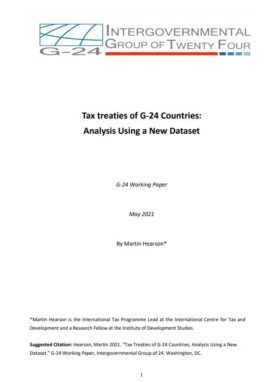G-24 Working Paper
Between them, the G-24 countries have over 800 bilateral tax treaties in force. Each treaty limits states’ ability to tax income earned within their borders by investors and service providers from the treaty partner. As well as constraining states’ ‘taxing rights’, they are also vulnerable to abuse through ‘treaty shopping’. A new dataset of developing countries’ tax treaties, developed with support from the G-24, allows for comparisons of the content of these treaties, between countries and over time.
Across many policy areas – including the taxation of services, indirect transfers of assets, and protection from abuse – newer and recently renegotiated treaties contain more provisions that are beneficial to capital and service-importing countries.
The Multilateral Convention to Implement Tax Treaty Related Measures to Prevent BEPS (MLI) offers improvements in some areas, especially protection from abuse. Yet, many older and weaker treaties remain in force and will not be satisfactorily strengthened through the MLI. Within the G-24 there is wide variation among treaties with the same partners, suggesting the possibility for South-South cooperation to strengthen renegotiation strategies
